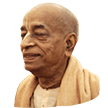Transcendence - an essential subject: Difference between revisions
(Created page with "Category:Essential Subjects <!----------------------- edit below this line -----------------------> <!------------------------ begin introduction text below --------------...") |
(Vanibot #0041: Moves Choose Another box to the end) |
||
| Line 2: | Line 2: | ||
<!----------------------- edit below this line -----------------------> | <!----------------------- edit below this line -----------------------> | ||
<!------------------------ begin introduction text below ------------------------> | <!------------------------ begin introduction text below ------------------------> | ||
A pure Vaiṣṇava is a liberated soul and is transcendental even to the position of a brāhmaṇa. In the material stage even a brāhmaṇa is also a although iconditioned soul becausen the brahminical stage the conception of Brahman or transcendence is realized, scientific knowledge of the Supreme Lord is lacking. One has to surpass the brahminical stage and reach the vasudeva stage to understand the Personality of Godhead Kṛṣṇa. The science of the Personality of Godhead is the subject matter for study by the postgraduate students in the spiritual line. Foolish men, or men with a poor fund of knowledge, do not understand the Supreme Lord, and they interpret Kṛṣṇa according to their respective whims. The fact is, however, that one cannot understand the science of the Personality of Godhead unless one is freed from the contamination of the material modes, even up to the stage of a brāhmaṇa. When a qualified brāhmaṇa factually becomes a Vaiṣṇava, in the enlivened state of liberation he can know what is actually the Personality of Godhead. | |||
Srila Prabhupada's books, lectures, conversations and letters offer a comprehensive presentation of this essential subject as seen in the Vaniquotes '''[[Vaniquotes:Category:Transcendence|Transcendence]]''' category. An introduction from his books is given below in the following | Srila Prabhupada's books, lectures, conversations and letters offer a comprehensive presentation of this essential subject as seen in the Vaniquotes '''[[Vaniquotes:Category:Transcendence|Transcendence]]''' category. An introduction from his books is given below in the following 10 quotes. | ||
<!-------- end introduction text and don't touch next three lines ---------> | <!-------- end introduction text and don't touch next three lines ---------> | ||
== Quotes from Srila Prabhupada's books == | == Quotes from Srila Prabhupada's books == | ||
<!----------------- edit quote boxes below this line -----------------> | <!----------------- edit quote boxes below this line -----------------> | ||
{{VaniQuotebox| | {{VaniQuotebox|A mundaner should not unnecessarily intrude into affairs of transcendence and thereby displease the Lord. One must always be on guard against this sort of devotional anomaly|A mundaner should not unnecessarily intrude into affairs of transcendence and thereby displease the Lord. One must always be on guard against this sort of devotional anomaly. A devotee is not meant to create disturbances to Kṛṣṇa. As Śrīla Rūpa Gosvāmī has explained, devotional service is ānukūlyena, or favorable to Kṛṣṇa. Acting unfavorably toward Kṛṣṇa is not devotion. Kaṁsa was the enemy of Kṛṣṇa. He always thought of Kṛṣṇa, but he thought of Him as an enemy. One should always avoid such unfavorable so-called service. '''(Caitanya-caritāmṛta, Ādi-līlā 4.41)'''}} | ||
{{VaniQuotebox| | {{VaniQuotebox|All a devotee's works are technically sacrifices because sacrifice aims at satisfying the Supreme Person, Visnu, Krsna. The resultant reactions to all such work certainly merge into transcendence, and one does not suffer material effects|Becoming fully Kṛṣṇa conscious, one is freed from all dualities and thus is free from the contaminations of the material modes. He can become liberated because he knows his constitutional position in relationship with Kṛṣṇa, and thus his mind cannot be drawn from Kṛṣṇa consciousness. Consequently, whatever he does, he does for Kṛṣṇa, who is the primeval Viṣṇu. Therefore, all his works are technically sacrifices because sacrifice aims at satisfying the Supreme Person, Viṣṇu, Kṛṣṇa. The resultant reactions to all such work certainly merge into transcendence, and one does not suffer material effects. '''(Bhagavad-gītā 4.23)'''}} | ||
{{VaniQuotebox| | {{VaniQuotebox|Although impersonal Brahman, Paramatma Brahman and Brahman as the Supreme Person are all on the same transcendental platform, the personal feature of the Supreme Brahman is the ultimate goal and last word in transcendence|Although impersonal Brahman, Paramatma Brahman and Brahman as the Supreme Person are all on the same transcendental platform, the personal feature of the Supreme Brahman is the ultimate goal and last word in transcendence. '''(Śrīmad-Bhāgavatam 4.31.3)'''}} | ||
{{VaniQuotebox| | {{VaniQuotebox|Because the senses are material, it is not at all possible to realize the Transcendence by them. Therefore the senses have to be spiritualized by the prescribed method under the direction of the spiritual master|The serious candidate must accept a bona fide spiritual master in order to be trained scientifically. Because the senses are material, it is not at all possible to realize the Transcendence by them. Therefore the senses have to be spiritualized by the prescribed method under the direction of the spiritual master. '''(Easy Journey to Other Planets, Chapter 1)'''}} | ||
{{VaniQuotebox| | {{VaniQuotebox|Beyond Brahma there is the Transcendence, who has no material form and is free from all material contaminations. Anyone who can know Him also becomes transcendental, but those who do not know Him suffer the miseries of the material world|In the material world Brahmā, the primeval living entity within the universe, is understood to be the supreme amongst the demigods, human beings and lower animals. But beyond Brahmā there is the Transcendence, who has no material form and is free from all material contaminations. Anyone who can know Him also becomes transcendental, but those who do not know Him suffer the miseries of the material world. '''(Bhagavad-gītā 7.7)'''}} | ||
{{VaniQuotebox| | {{VaniQuotebox|Conceivable dualism and monism are conceptions of the imperfect senses, which are unable to reach the Transcendence because the Transcendence is beyond the conception of limited potency|Śrī Caitanya Mahāprabhu preached the philosophy of inconceivable, simultaneous oneness with the Lord and difference from Him. Conceivable dualism and monism are conceptions of the imperfect senses, which are unable to reach the Transcendence because the Transcendence is beyond the conception of limited potency. The actions of Śrī Advaita Prabhu, however, give tangible proof of inconceivable nondualism. '''(Caitanya-caritāmṛta, Ādi-līlā 3.102)'''}} | ||
{{VaniQuotebox| | {{VaniQuotebox|He who is situated in pure knowledge of the transcendence of the Supreme Personality of God is so protected in devotional service that material contamination cannot touch him|By association with pure devotees the inquisitive, the distressed, the seeker after material amelioration and the man in knowledge all become themselves pure. But in the preparatory stage, the man who is in full knowledge of the Supreme Lord and is at the same time executing devotional service is very dear to the Lord. He who is situated in pure knowledge of the transcendence of the Supreme Personality of God is so protected in devotional service that material contamination cannot touch him. '''(Bhagavad-gītā 7.17)'''}} | ||
{{VaniQuotebox| | {{VaniQuotebox|In three out of the four millenniums (namely Satya-yuga, Treta-yuga and Dvapara-yuga) people had the honor to be able to understand transcendence through the path of disciplic succession|In three out of the four millenniums (namely Satya-yuga, Tretā-yuga and Dvāpara-yuga) people had the honor to be able to understand transcendence through the path of disciplic succession. However, in the present age, people have no interest in the disciplic succession. Instead, they have invented many paths of logic and argument. This individual attempt to understand the supreme transcendence (called the ascending process) is not approved by the Vedas. The Absolute Truth must descend from the absolute platform. He is not to be understood by the ascending process. '''(Teachings of Lord Caitanya, Chapter 18)'''}} | ||
{{VaniQuotebox|One may come to the right conclusion regarding the Lord's transcendental position. One who can come to the conclusion of the Lord's transcendence can become a devotee of the Lord|One should always discriminate between the activities of the Lord and those of ordinary living beings. Thus one may come to the right conclusion regarding the Lord's transcendental position. One who can come to the conclusion of the Lord's transcendence can become a devotee of the Lord and can at once be free from all reactions of past deeds. It is said, karmāṇi nirdahati kintu ca bhakti-bhājām: the Lord minimizes or nullifies the reactionary influence of the devotee's past deeds. '''(Śrīmad-Bhāgavatam 3.1.44)'''}} | |||
{{VaniQuotebox|One should know for certain that nothing can exist in this cosmic manifestation that has no real counterpart in the spiritual field. All material manifestations are emanations of the Transcendence|One should know for certain that nothing can exist in this cosmic manifestation that has no real counterpart in the spiritual field. All material manifestations are emanations of the Transcendence. The erotic principles of amorous love reflected in mixed material values are perverted reflections of the reality of spirit, but one cannot understand the reality unless one is sufficiently educated in the spiritual science. '''(Caitanya-caritāmṛta, Ādi-līlā 4.29)'''}} | |||
<!----------------- edit quote boxes above this line -----------------> | <!----------------- edit quote boxes above this line -----------------> | ||
| Line 30: | Line 34: | ||
'''Transcendence - [[Vaniquotes:Category:Transcendence|explore more within this category]]'''. | '''Transcendence - [[Vaniquotes:Category:Transcendence|explore more within this category]]'''. | ||
{{EsentialSubjectTotal}} | {{EsentialSubjectTotal}} | ||
<div style="float:left;"> | |||
{{EssentialSubjectnav}} | |||
</div> | |||
__NOTOC__ | __NOTOC__ | ||
__NOEDITSECTION__ | __NOEDITSECTION__ | ||
Latest revision as of 17:55, 22 November 2020
A pure Vaiṣṇava is a liberated soul and is transcendental even to the position of a brāhmaṇa. In the material stage even a brāhmaṇa is also a although iconditioned soul becausen the brahminical stage the conception of Brahman or transcendence is realized, scientific knowledge of the Supreme Lord is lacking. One has to surpass the brahminical stage and reach the vasudeva stage to understand the Personality of Godhead Kṛṣṇa. The science of the Personality of Godhead is the subject matter for study by the postgraduate students in the spiritual line. Foolish men, or men with a poor fund of knowledge, do not understand the Supreme Lord, and they interpret Kṛṣṇa according to their respective whims. The fact is, however, that one cannot understand the science of the Personality of Godhead unless one is freed from the contamination of the material modes, even up to the stage of a brāhmaṇa. When a qualified brāhmaṇa factually becomes a Vaiṣṇava, in the enlivened state of liberation he can know what is actually the Personality of Godhead.
Srila Prabhupada's books, lectures, conversations and letters offer a comprehensive presentation of this essential subject as seen in the Vaniquotes Transcendence category. An introduction from his books is given below in the following 10 quotes.
Quotes from Srila Prabhupada's books
Transcendence - explore more within this category.
Vanipedia has now over 903 introductory articles compiled from Srila Prabhupada's books under the series titled Essential Subjects. All these articles can be seen in the Table of Content on the right side of this article and also here in this Umbrella Category. Browse through them to relish the breadth and depth of Srila Prabhupada's teachings - There is a subject for everyone.









